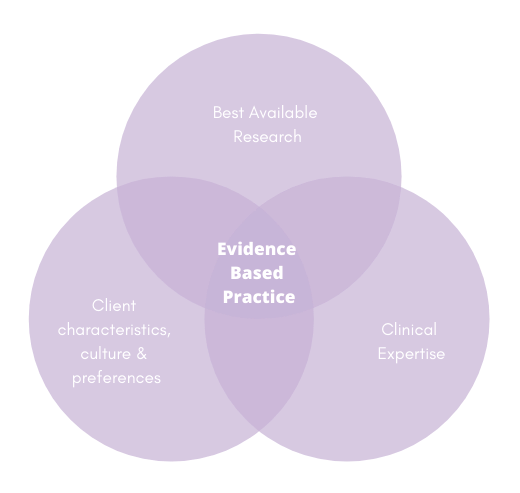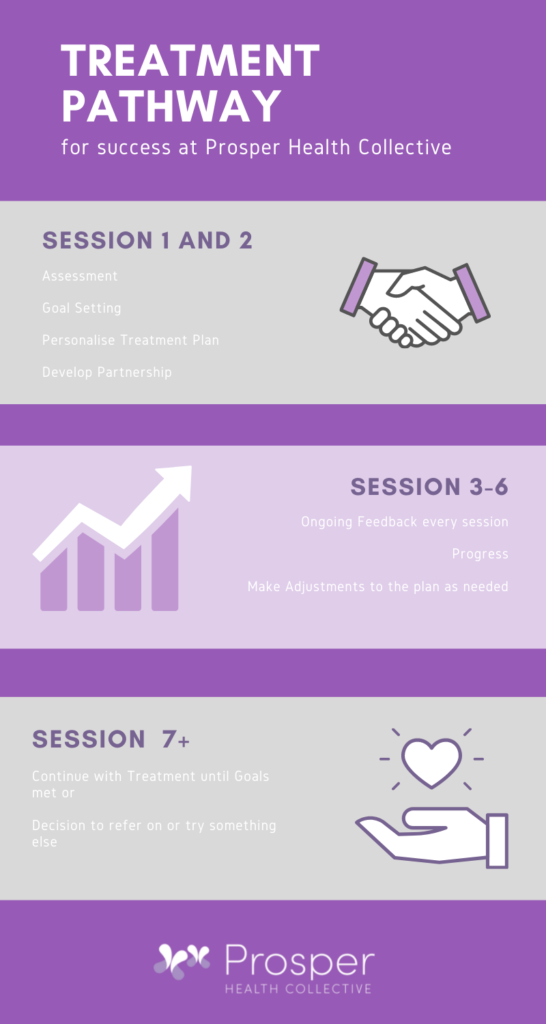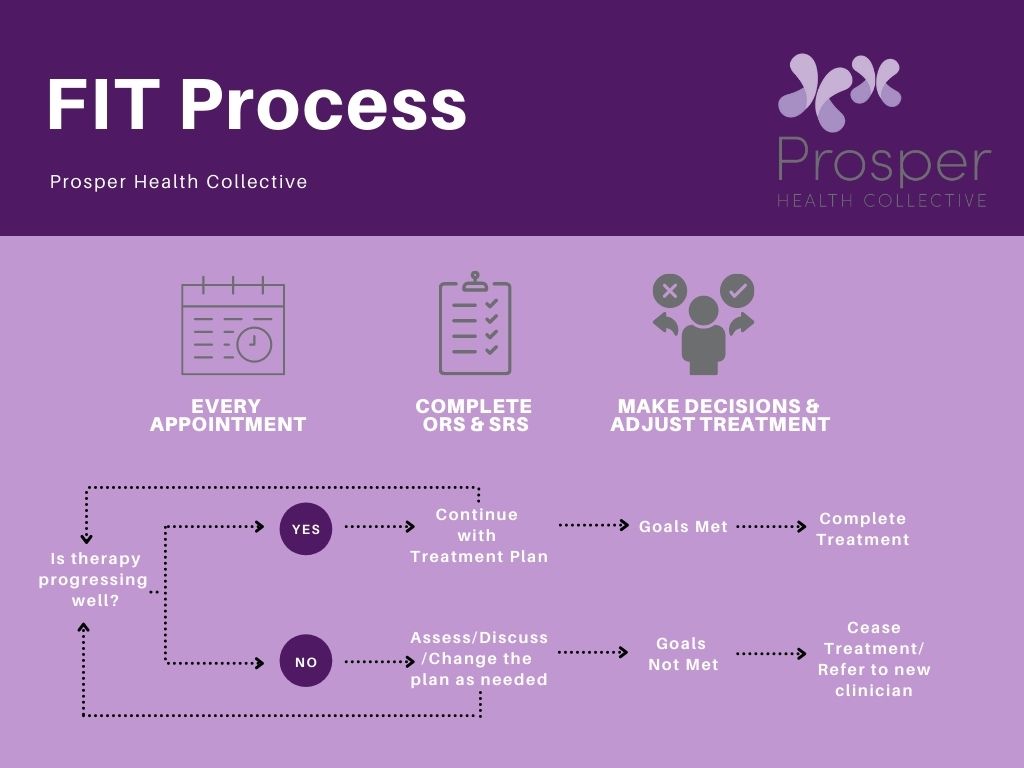Our Approach
Services
Our Approach
Our Promise to our Clients
Delivering Great Client Outcomes
Prosper Health Collective will work together with you to help you flourish and thrive.
We will do this through partnering with you to understand your story, your needs and your treatment goals. We will use evidence based interventions to design a tailored treatment that allows you to achieve these goals and thrive in your life. We will always be non judgmental, ethical, professional and hold you with positive regard.
What sets us apart from other private practices is our commitments to client centered, evidence based, values driven practice. We genuinely care and want to work with you to allow you to live a rich, full and meaningful life.
How do we achieve this promise?
Our Approach
Evidence Based Practice
EBP is a means to enhance the delivery of services to clients to ensure the best outcomes
Having the best training or the most effective treatment strategy is only one part of the equation when it comes to psychotherapy. True evidence based practice comes from the integration of best research evidence with clinical expertise and client characteristics.
For clients to achieve the best outcomes in treatment our psychologists must take 3 very important things into consideration to aid their decision making process.
The first is the client themselves, their characteristics, values and culture. We must consider who you are as a person before we provide a treatment to you.
The second is a working knowledge of the scientific evidence that shows us which treatments are effective.
Finally we must use our clinical expertise (our knowledge, training and skills) to integrate what we know about our client and the research evidence, to make decisions that will help clients to achieve their goals in therapy.
To do these 3 things well and achieve our promise, we must closely monitor the client’s progress.

Therapeutic Alliance
The best predictor of outcome in therapy is a strong therapeutic alliance
A therapeutic alliance is simply how you and your psychologist connect and engage with each other.It relies upon having an agreement on the goals of the treatment, the tasks to be undertaken in treatment, and the development of a personal bond made up of reciprocal positive feelings.
Environment
The environment that your psychologist makes for you needs to be warm, safe and non-judgmental. Your psychologist will work with you to create this environment.
If you do not feel comfortable, it is important that you let the psychologist know. A good psychologist will welcome this feedback.
Goals and Treatment Plan
Clients see psychologists for a reason. There is usually something they want to achieve or an outcome that they require. It is important that in the early stages you take the time to devise clear goals for treatment and there is a shared understanding of the outcome desired.
From here your psychologist will set about developing a treatment plan under the guise of the Evidence Based Practice approach discussed above. Your psychologist will share this plan with you and collaborate with you about it.
Feedback and Refinement
In order for your psychologist to know that gains are being made towards your goals, they will seek your feedback each session to determine what progress is being made.
This feedback is ont only about improvements to your wellbeing but also asks for feedback about the therapy relationship. Research shows us that the strength of this relationship is a strong predictor of clients achieving their goals. As such it is important that we measure it and discuss it if it is not strong.
Gathering this information at each session helps us to refine our treatments and ensure clinical excellence. We do this through a process called Feedback Informed Therapy.
The figure outlines the treatment pathway at Prosper.

FIT
Achieving excellence in practice involves close attention to what is working and what is not
At Prosper Health Collective we believe that we should demonstrate outcomes from your investment that you have made into yourself or your family member.
To help us achieve this we use a process called Feedback Informed Therapy (FIT).
Why we measure
Research shows it’s not the type of therapy that makes the difference, but the track record of the therapist that best predicts clinical improvement.
Why do we measure? To be accountable, and to improve what we do and how we do it.
At Prosper we are genuinely interested in working with you to make sure you get the best therapy experience and outcome. FIT helps us to do this.
What we measure
The FIT process asks client to complete two ultra brief (less than one minute) questionnaires at each and every appointment.
The first questionnaire, completed at the beginning of the session essentially asks – How have you felt in the past week?
The second questionnaire, completed at the end of the session boils down to – How did this session go?
We want your honest answers to these questions and we provide you with a graph of change over time to see if we are heading in the right direction.
How it helps you
Your psychologist will discuss the results of the two questionnaires, and together you can decide if therapy should continue as is, or if a change is needed.
Gathering this information provides a level of certainty that treatment is effective and gains are being made.
You can choose to not be apart of our FIT process if you do not want to participate.
The image below outlines the FIT process we use at Prosper

How it helps us
With the data we collect throughout the year we can calculate the effectiveness of each psychologist and compare their performance to relevant benchmarks. This helps us to make sure that all of our psychologists are delivering an excellent quality of care.
We also use the information to help each psychologist set themselves goals to improve their performance. We support them with continuous professional development to encourage ongoing learning and clinical excellence.
PHC results
It can take up to 12 months for each psychologist to start building data that is meaningful and useful in regards to their effectiveness. As we only embarked on FIT in August 2021 we do not yet have any data to share.
We look forward to publishing our results here in the future.
Benchmarks
Benchmarks regarding effectiveness can be taken from the research literature. This gives our psychologists a guidepost on what they should be aiming for in their results.
These benchmarks are taken from a variety of sources including:
– a large study by Hansen, Lambert and Forman (2002), which looked at real world outcomes in therapy from a range of large organisations (D = 0.15)
– a meta-analysis where they compared all published results for therapy outcomes (Smith and Glass, 1981) (D = 0.54)
– A paper was published by Dr Daryl Chow from Curtin University looking at what makes top performing therapists (D = 1.1)
(Acknowledgement, Benchmark Psychology)
